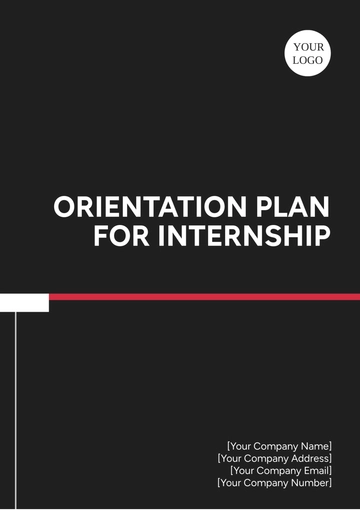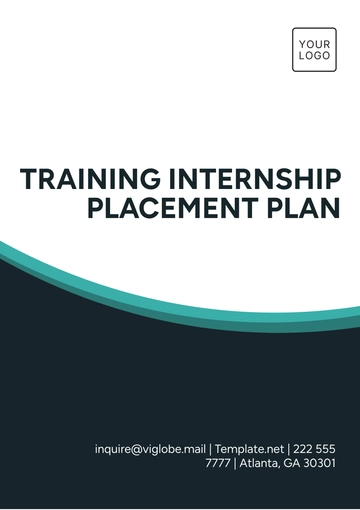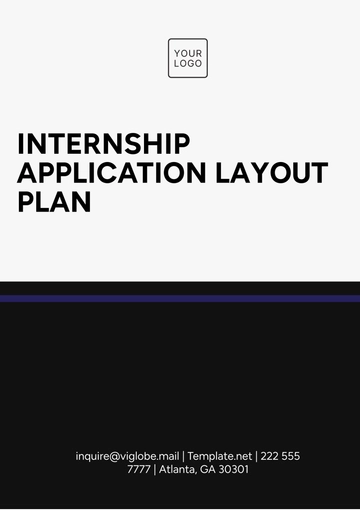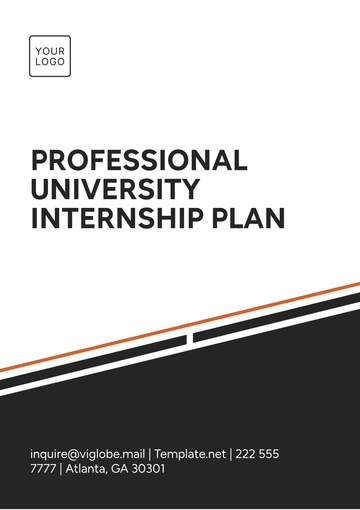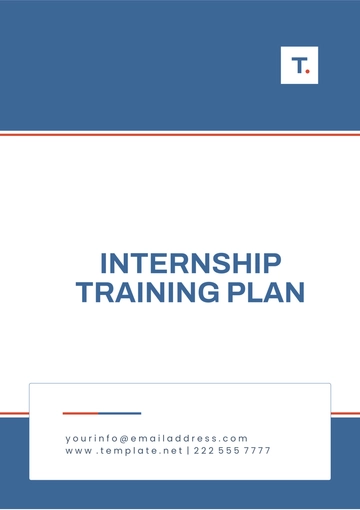Free Printable Training Plan for Internship
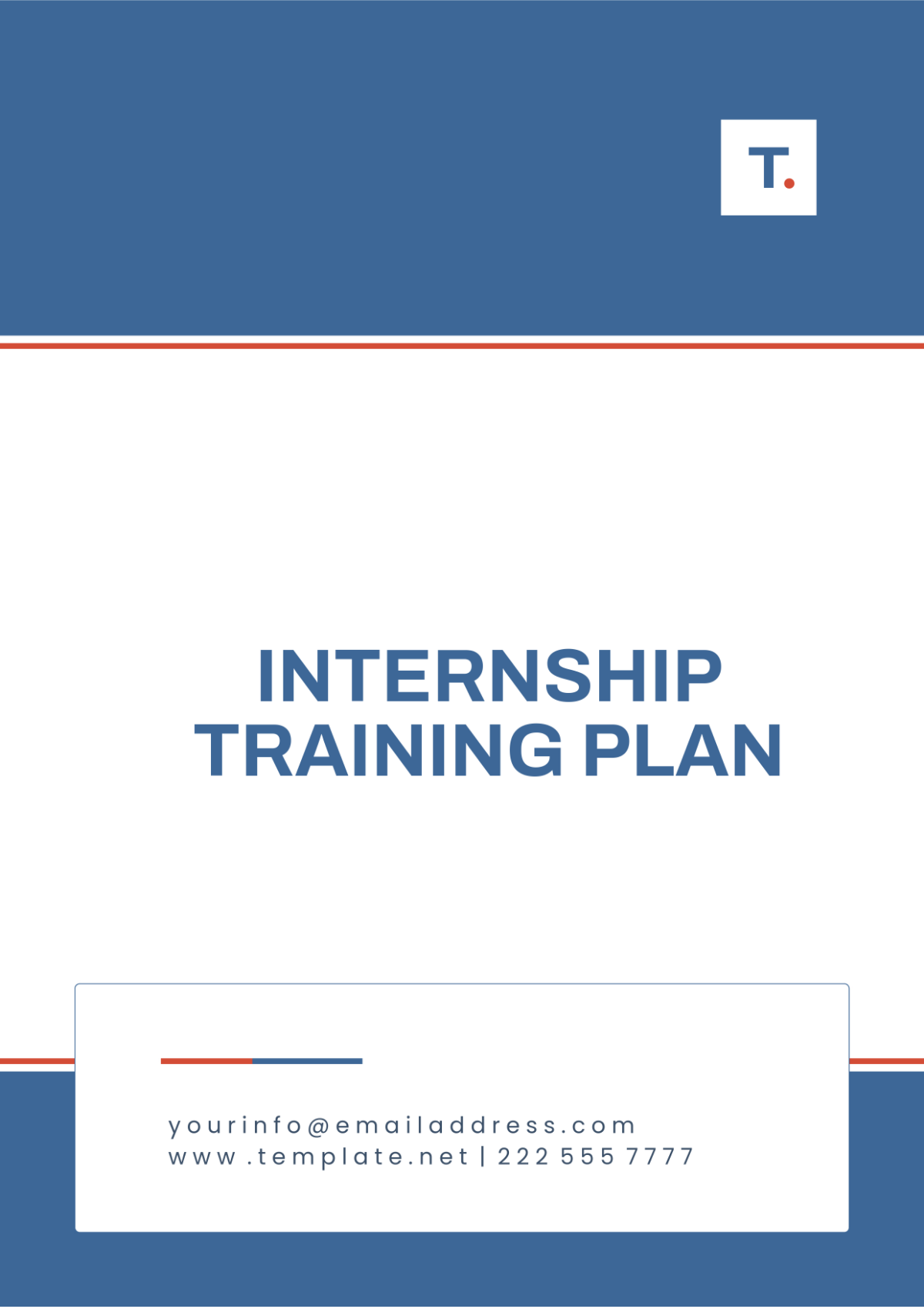
I. Introduction
The Internship Training Plan establishes a structured, goal-oriented approach to onboarding and mentoring interns, ensuring a successful, impactful experience for both the interns and the organization. This plan sets clear objectives, responsibilities, and timelines to foster a productive learning environment and provide meaningful professional development opportunities.
II. Goals and Objectives
The overarching goal of this internship program is to immerse interns in real-world professional environments, equipping them with essential skills and knowledge that directly align with the organization’s objectives and industry standards.
A. Learning Outcomes
Professional Skill Development: Interns will cultivate industry-specific technical and professional skills that enhance their academic training.
Practical Workplace Experience: Interns will be fully integrated into the day-to-day operations, allowing them to gain hands-on experience in a professional setting.
Understanding Organizational Dynamics: Interns will become familiar with the company’s culture, structure, and workflow, gaining insights into internal processes and decision-making.
Soft Skills Enhancement: The program will emphasize the development of essential soft skills such as communication, teamwork, time management, problem-solving, and adaptability.
III. Internship Structure
The internship is divided into a series of well-defined phases, each designed to build upon the previous one, ensuring a holistic and supportive learning journey.
Phase | Description | Duration |
|---|---|---|
Orientation | A comprehensive introduction to the organization’s policies, culture, key team members, and work environment. | 1 Week |
Training | Focused hands-on training led by experienced mentors, providing interns with the knowledge and tools to excel in their roles. | 2-4 Weeks |
Project Work | Interns will apply their skills through real-world projects, contributing directly to the organization’s objectives. | 10-12 Weeks |
Evaluation & Feedback | Regular performance assessments, including formal feedback sessions to review progress and provide guidance for improvement. | 1 Week |
IV. Roles and Responsibilities
A. Interns
Task Completion: Interns are expected to approach all assigned tasks with responsibility, creativity, and dedication, delivering high-quality work within set deadlines.
Communication: Regular, proactive communication with supervisors regarding project progress, challenges, and milestones is essential.
Participation: Active engagement in training sessions, team meetings, and other organizational activities to deepen their understanding and integration into the workplace.
Continuous Learning: Interns should be open to feedback, continuously seeking opportunities to learn and improve.
B. Supervisors
Guidance and Mentorship: Supervisors will provide clear expectations, guidance, and resources to help interns succeed in their roles, ensuring they are well-supported throughout their tenure.
Regular Check-ins: Conduct frequent check-ins to assess the intern’s progress, offering constructive feedback and addressing any potential issues or areas for improvement.
Project Oversight: Ensure interns are working on meaningful projects that contribute to both their development and the organization’s goals.
Skill Development: Provide opportunities for interns to expand their skill set through challenging tasks and access to relevant tools, software, and training materials.
V. Evaluation and Feedback
A robust evaluation system is integral to the success of the internship. Performance reviews will be conducted at both the midpoint and the conclusion of the internship to provide detailed, actionable feedback and assess growth.
A. Assessment Criteria
Quality of Work: The intern’s ability to produce high-quality deliverables that meet or exceed project requirements.
Team Collaboration: How effectively the intern works with colleagues and contributes to group efforts.
Communication: Clarity, professionalism, and frequency of communication regarding project status and any challenges encountered.
Adaptability and Learning: The intern’s willingness to learn new skills, adapt to evolving project needs, and take on constructive feedback to improve performance.
VI. Conclusion
This Internship Training Plan serves as a comprehensive framework to create a productive, educational, and mutually beneficial internship experience. By clearly outlining expectations, providing structured learning opportunities, and fostering continuous feedback, the program ensures that interns not only gain valuable skills and insights but also contribute meaningfully to the organization’s success. This strategic approach will help shape future professionals equipped to excel in their careers while building lasting relationships with the organization.
- 100% Customizable, free editor
- Access 1 Million+ Templates, photo’s & graphics
- Download or share as a template
- Click and replace photos, graphics, text, backgrounds
- Resize, crop, AI write & more
- Access advanced editor
Enhance your training sessions with our Printable Training Plan for Internship Template from Template.net. This editable template provides a comprehensive framework for organizing training activities and schedules. Fully customizable, it allows you to adjust content to fit your internship program’s goals. It’s also editable in our Ai Editor Tool, ensuring you can make updates on the fly.
You may also like
- Finance Plan
- Construction Plan
- Sales Plan
- Development Plan
- Career Plan
- Budget Plan
- HR Plan
- Education Plan
- Transition Plan
- Work Plan
- Training Plan
- Communication Plan
- Operation Plan
- Health And Safety Plan
- Strategy Plan
- Professional Development Plan
- Advertising Plan
- Risk Management Plan
- Restaurant Plan
- School Plan
- Nursing Home Patient Care Plan
- Nursing Care Plan
- Plan Event
- Startup Plan
- Social Media Plan
- Staffing Plan
- Annual Plan
- Content Plan
- Payment Plan
- Implementation Plan
- Hotel Plan
- Workout Plan
- Accounting Plan
- Campaign Plan
- Essay Plan
- 30 60 90 Day Plan
- Research Plan
- Recruitment Plan
- 90 Day Plan
- Quarterly Plan
- Emergency Plan
- 5 Year Plan
- Gym Plan
- Personal Plan
- IT and Software Plan
- Treatment Plan
- Real Estate Plan
- Law Firm Plan
- Healthcare Plan
- Improvement Plan
- Media Plan
- 5 Year Business Plan
- Learning Plan
- Marketing Campaign Plan
- Travel Agency Plan
- Cleaning Services Plan
- Interior Design Plan
- Performance Plan
- PR Plan
- Birth Plan
- Life Plan
- SEO Plan
- Disaster Recovery Plan
- Continuity Plan
- Launch Plan
- Legal Plan
- Behavior Plan
- Performance Improvement Plan
- Salon Plan
- Security Plan
- Security Management Plan
- Employee Development Plan
- Quality Plan
- Service Improvement Plan
- Growth Plan
- Incident Response Plan
- Basketball Plan
- Emergency Action Plan
- Product Launch Plan
- Spa Plan
- Employee Training Plan
- Data Analysis Plan
- Employee Action Plan
- Territory Plan
- Audit Plan
- Classroom Plan
- Activity Plan
- Parenting Plan
- Care Plan
- Project Execution Plan
- Exercise Plan
- Internship Plan
- Software Development Plan
- Continuous Improvement Plan
- Leave Plan
- 90 Day Sales Plan
- Advertising Agency Plan
- Employee Transition Plan
- Smart Action Plan
- Workplace Safety Plan
- Behavior Change Plan
- Contingency Plan
- Continuity of Operations Plan
- Health Plan
- Quality Control Plan
- Self Plan
- Sports Development Plan
- Change Management Plan
- Ecommerce Plan
- Personal Financial Plan
- Process Improvement Plan
- 30-60-90 Day Sales Plan
- Crisis Management Plan
- Engagement Plan
- Execution Plan
- Pandemic Plan
- Quality Assurance Plan
- Service Continuity Plan
- Agile Project Plan
- Fundraising Plan
- Job Transition Plan
- Asset Maintenance Plan
- Maintenance Plan
- Software Test Plan
- Staff Training and Development Plan
- 3 Year Plan
- Brand Activation Plan
- Release Plan
- Resource Plan
- Risk Mitigation Plan
- Teacher Plan
- 30 60 90 Day Plan for New Manager
- Food Safety Plan
- Food Truck Plan
- Hiring Plan
- Quality Management Plan
- Wellness Plan
- Behavior Intervention Plan
- Bonus Plan
- Investment Plan
- Maternity Leave Plan
- Pandemic Response Plan
- Succession Planning
- Coaching Plan
- Configuration Management Plan
- Remote Work Plan
- Self Care Plan
- Teaching Plan
- 100-Day Plan
- HACCP Plan
- Student Plan
- Sustainability Plan
- 30 60 90 Day Plan for Interview
- Access Plan
- Site Specific Safety Plan






